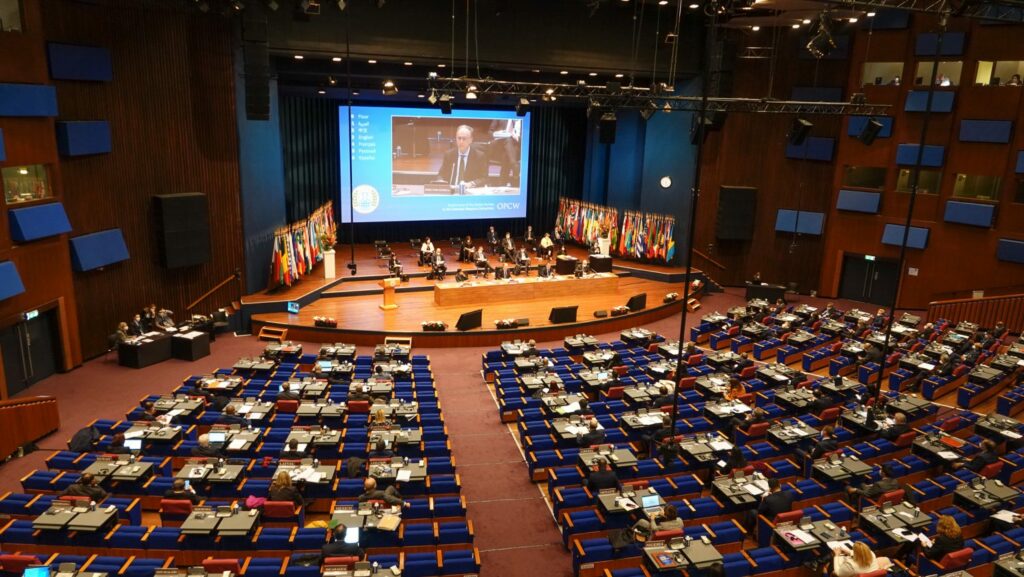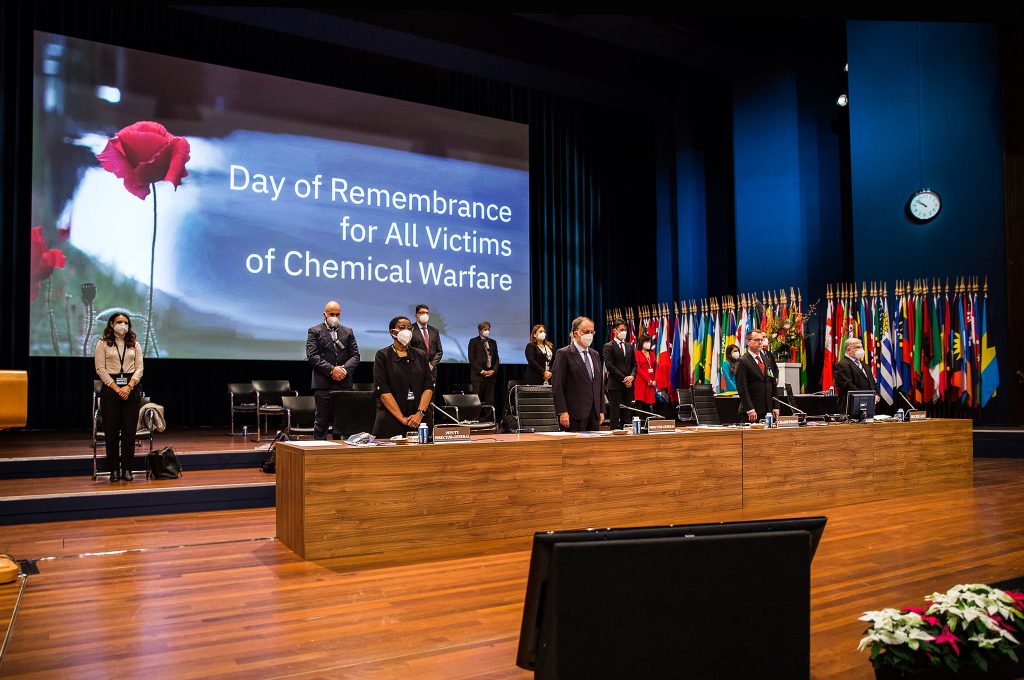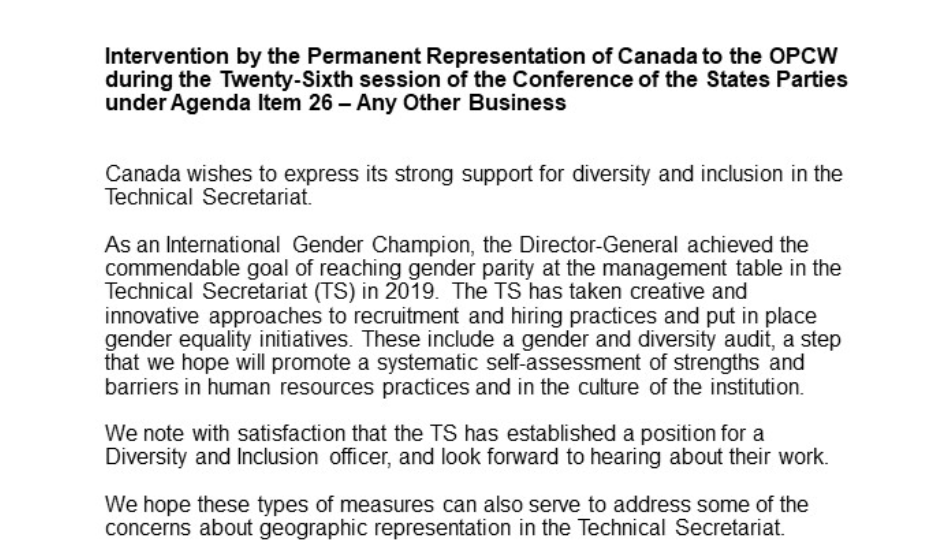OPCW: 26th Session of the Conference of the States Parties (CSP-26)
I am pleased to present here the summary of the annual OPCW Conference of States Parties, prepared by Leanne Quinn of the CWC Coalition. The Trench is a member of the CWC Coalition.
Jean Pascal
Summary Report
During the annual Conference of the States Parties to the Chemical Weapons Convention (CWC), representatives from all the States Parties to the CWC convene in The Hague to oversee the implementation of the CWC, promote the goals and obligations of the treaty, and review treaty compliance, among other tasks. CSP-26 was held from 29 November to 3 December 2021.
This summary report will cover:
- Descriptions and key quotes of the major thematic topics discussed during CSP-26
- Explanations and results of roll call votes
- Additional items of note
Need a refresher on the OPCW, CWC, or Executive Council? Check out these short educational videos produced by the OPCW.

Major Topics and Key Quotes
Please note: selected quotes are not necessarily representative of the views of the CWC Coalition or any of its members. Quotes are selected to highlight the diversity of opinions in the OPCW, and we try to find quotes that summarize the views of more than one country. Quotes will not always reflect all view points – they serve an educational purpose, but are not intended to give the reader a full understanding of all perspectives on each of these complex issues.
Election of the Director-General
H.E. Fernando Arias, the current Director-General of the OPCW, was elected for a second term as the Director-General. His second term will start on 25 July 2022, and go to 24 July 2026. Although one member state voiced its opposition, ultimately no delegates objected to the decision being adopted and it was passed with consensus.
“Ambassador Arias’ steady hand has been an asset to us all during these most challenging times, and the wide support he received for a renewed mandate clearly demonstrates the shared recognition of his diplomatic skills. There is no shortage of challenges ahead. To name some of the key ones: the ongoing pandemic and its impact on work of the OPCW; the search for ways to reduce the stifling polarization which undermines trust in this organization; the need to promote equitable geographic representation in order to render the organization more fit for its purpose; and a gradual steering of the OPCW into a new terrain, in which chemical weapons will have finally been eliminated, and cooperation will assume paramount status amongst the goals of the organization.” – Delegate from Brazil (See: minute 14:41)
Programme and Budget for 2022-2023
For the first time, the OPCW passed a biennial budget, which means it covers expenses for both 2022 and 2023, rather than an annual budget for 2022 only. Moving from an annual budget to a biennial budget is seen as a way to help the OPCW set clear priorities and assist with longer-term planning. Some nations expressed the opinion that the programme and budget should be two separate votes. Vote breakdown: 102 yes, 12 no, 18 abstained.
“After a decade of unmitigated loss of purchasing power due to inflation, the OPCW’s programmatic activities could not be maintained with a Zero Nominal Growth budgeting approach. The Zero Real Growth approached applied in a limited degree for 2022-2023 budget should bring more sustainable to the implementation of the organization’s mandate.” – H.E. Fernando Arias, Director General of the OPCW (see: minute 1:42:40)
Russia
During CSP-26, fifty-five member states produced a joint statement regarding the poisoning of Alexei Navalny in Russia. At Executive Council Session 98 (EC-98) in October, the UK and 44 other member states submitted four questions to Russia, asking Russia to explain what steps it has taken and what steps it plans to take to address and investigate the Navalny poisoning. The block of 45 nations was unsatisfied with Russia’s response. Russia asked its own set of questions, and was unsatisfied with the responses from the UK, France, Germany, and Sweden. The two sides again expressed their displeasure with each others’ answers at CSP-26.
“It is not credible to suggest that the Russian Federation is unable to investigate the poisoning of a Russian citizen with a novichok nerve agent on Russian soil. And it is deeply regrettable that rather than answering the questions posed by 45 States Parties, Russia has returned to a familiar pattern of attacking other states and the Technical Secretariat. The United Kingdom understands these assertions as an attempt to deflect attention from Russian state responsibility for the chemical weapons attack on Mr. Navalny.” – CSP-26 Agenda 9d – Navalny; joint statement
CNS-Acting Chemicals
Member states voted on a decision titled “Understanding Regarding the Aerosolized Use of Central Nervous System-Acting Chemicals for Law Enforcement Purposes.” The CWC allows the use of chemical agents in very limited instances or “purposes.” Article 2 paragraph 9 of the CWC includes “law enforcement including domestic riot control purposes” as one of the “Purposes Not Prohibited Under the Convention.” This means that a nation’s law enforcement personnel are allowed to use certain chemicals for domestic riot control purposes. The decision passed at CSP-26 decides that the aerosolized use of CNS-acting chemicals by law enforcement should be understood to be inconsistent with law enforcement purposes as a “Purposed Not Prohibited Under the Convention.” More simply, the decision says that everyone should understand that law enforcement use of aerosolized CNS-acting chemicals should not be allowed.
“We are of the view that the decision does not create any obligations for States Parties. It rather intends to identify our common understanding that using CNS-acting chemicals in aerosolized form, which is likely to result in permanent harm or death, is inconsistent with the law enforcement purposes as a purpose not prohibited under the Convention.” – Delegate for the Republic of Korea (see: minute 37:54)
The Investigation and Implementation Team (IIT)
The Investigation and Identification Team (IIT) was established by the OPCW in 2018 and is “mandated to investigate cases where the OPCW Fact-Finding Mission (FFM) in Syria has determined that the use or likely use of chemical weapons has occurred.” Some nations claim that the IIT is outside the mandate of the CWC and should not be considered a legitimate part of the OPCW. During CSP-26, Russia led a proposal to have paragraphs mentioning the activities of the IIT removed from the Annual Report of the OPCW on the Implementation of the CWC in 2020.
“The Lao PDR considers the establishment of the Investigation and Identification Team to be outside the mandate of the CWC. […] Lao PDR does not regard establishment of IIT as fait accompli. Lao PDR appreciates the work of the Technical Secretariat in drafting the Annual Report 2021 [sic: 2020] which is rather comprehensive. However, we voted abstention, which is meant to reject those paragraphs in the report concerning the IIT and so-called it’s findings.” – Delegation of the Lao Peoples Democratic Republic (see: minute 1:04:38)
Syria
At the second half of the 25th Conference of the States Parties (April 2021), the states parties voted to suspend Syria’s rights and privileges under the convention until it addresses 19 outstanding issues regarding its initial declaration of its chemical weapons stockpile and program. Syria’s rights and privileges will be reinstated once the Director-General reports that Syria has taken the necessary measures to come back into compliance. The Director-General reported during CSP-26 that Syria has not completed any of the measures.
“Non-compliance should not be seen as a dead end. It is the beginning of a new road: one that shows further commitment from States Parties to ensure that obligations under the Convention are respected by all the member states. On my part, with a view to participate in efforts to restore compliance in the shortest time possible, I have invited the Minister of Foreign Affairs of Syria to an in-person meeting. Both parties have appointed officials in charge of the preparations, including the determination of the date, location, agenda, and composition of the delegations.” – H.E. Fernando Arias, Director-General of the OPCW (see: minute 1:49:39)
NGO Participation
H.E. Amb. Lisa Helfand of Canada presented a joint statement on behalf of 54 states entitled “Joint Statement Concerning Accreditation of Non-Governmental Organizations for the Twenty-Sixth Session of the Conference of the States Parties.” The statement expressed that NGO participation is vital. However, it also expressed concern that a small minority of States Parties are blocking the accreditation of NGOs and undermining the spirit of cooperation in the OPCW. A decision on NGO attendance and participation was also passed.
“NGOs play a key role in supporting the global fight against the use of chemical weapons. It is crucial that the Conference of the States Parties engages in a wide range of civil society organizations and that we hear from diverse voices, in order to strengthen the OPCW, and to ensure that it capable of addressing the current and future challenges we face in achieving our collective aim of a world free of chemical weapons. […] We need the expertise and voice of civil society in the room.” – H.E. Lisa Helfand, Canada
US Stockpile Elimination
Under its treaty obligations, the United States must finish destroying its chemical weapons stockpile by September 2023. Out of the 8 member states that declared chemical weapons stockpiles, the United States is the last to finish stockpile destruction. The OPCW has been intensely focused on stockpile elimination since the CWC entered into force in 1997. Observers of the OPCW are interested in seeing which CWC obligations and priorities will now take precedence in the post-destruction phase of the OPCW, and how the OPCW will handle that pivot.
“The United States has completed destruction of over 97% of its declared stockpile. It is on track to meet the planned completion date of September 30, 2023. We have also taken extraordinary steps to maintain a continuous presence of OPCW inspectors at both our destruction facilities to ensure continued verified destruction of our stockpile despite the pandemic.” – H.E. Joseph Manso, United States of America (see: minute 9:53)
Voting by Consensus
Several nations have continuously expressed that the Conference of the States Parties should only adopt a decision once consensus has been reached. Some nations allege that other countries will push through “politically motivated” decisions if they believe they have enough votes. Consensus voting would mean that any state party could veto or delay a proposed decision. Multiple nations abstained from the 4 roll call votes that occurred during the Conference and mentioned the lack of consensus as the reason for their abstention.
“In the difficult and fractured world of multilateral disarmament, the annual Conferences in the past always showed the way through its ‘consensus’ based decision making. Lack of consensus, Mr. Chairperson, as history and practice tell us, is not beneficial for global disarmament and would not yield anything except politicization and hollow grandstanding.” – H.E. Ambassador Suljuk Mustansar Tarar, Pakistan
Abandoned Chemical Weapons
Japan has an obligation as an Abandoning State to complete the destruction of abandoned chemical weapons left on Chinese territory. COVID-19 impacted the destruction schedule, but the destruction facility at Haerbaling (China) resumed last May and progress has been made.
“Judging from the fact that the overall pace of Japanese destruction is behind schedule, the 2022 deadline will not be met. China regrets that. Meanwhile, with a pragmatic, responsible, and constructive approach, China is ready for holding consultations with Japan to develop feasible future targets for destruction along with detailed plans and making appropriate arrangements as early as possible. We are also willing to closely liaise with Japan and the Secretariat to make the visit of the EC delegation possible when time is mature.” – Delegate from China (note: this quote is based off the English live translation of the statement and does not constitute a verbatim record of the proceedings. This quote will be updated if an official translation is posted to the OPCW website. See: minute 5:53)
Roll Call Votes
If you note any issues in our votes section, please reach out via the Contact Us page.
Vote to Approve the Programme and Budget for 2022-2023
“The matter presently before the Conference is the adoption of the Draft Decision entitled “Draft Programme and Budget of the OPCW for 2022-2023 (C26/DEC.CRP5) dated 20 October 2021. If a delegation is in favor of adopting the draft decision, it should vote yes. If a delegation is not in favor of adopting the draft decision, it should vote no. Members who wish to abstain from voting should say abstention.” – OPCW Legal Advisor
Vote to Approve the Understanding About CNS-Acting Chemicals
“The matter presently before the Conference is the adoption of the Draft Decision entitled “Understanding Regarding the Aerosolized Use of Central Nervous System-Acting Chemicals for Law Enforcement Purposes” (C26/DEC.CRP1/REV1) dated 25 November 2021. If a delegation is in favor of adopting the draft decision, it should vote yes. If a delegation is not in favor of adopting the draft decision, then it should vote no. Members who wish to abstain from voting should say abstention.” -OPCW Legal Advisor
Vote to Approve the Annual Report of the OPCW for 2020
“The matter presently before the Conference is the Draft Annual Report of the OPCW on the Implementation of the Chemical Weapons Convention in 2020 (EC972/C26/CRP1) dated 7 July 2021. If a delegation is in favor of adopting the draft report, it should vote yes. If a delegation is not in favor of adopting the draft report, then it should vote no. Members who wish to abstain from voting should say abstention.” – OPCW Legal Advisor
Vote on the Russian Proposal for the Annual Report of the OPCW for 2020
“The matter presently before the Conference is the proposal of the Russian Federation to hold a separate vote on paragraphs 132-136, 138-140, and 411 of the draft Annual Report of the OPCW on the Implementation of the Chemical Weapons Convention in 2020, document EC972/C26/CRP1 dated 7 July 2021. If a delegation is in favor of the proposal, it should vote yes. If a delegation is not in favor of the proposal, then it should vote no. Members who wish to abstain from voting should say abstention.” – OPCW Legal Advisor
How does voting work?
When possible, votes are taken by consensus. If there are no dissenting votes, then a roll call vote does not need to be taken, and the Chairperson of the Conference can declare the decision as adopted by the Conference.
If it looks like there will not be a consensus vote, a member state can request that a roll call vote is made. The Chairperson will then have to delay the vote by 24 hours. During that 24 hour period, the Chairperson will hold individual consultations with member states to try and achieve consensus.
If consensus cannot be achieved during the 24 hour period, a roll call vote will be held at the end of the 24 hours.
Rule 69, in accordance with Article 8 Paragraph 18 of the Convention, stipulates that the Conference shall take the decision on matters of substance by a 2/3 majority of the members present and voting unless specified otherwise in the Convention.
The Secretary of the Conference picks the member state that will vote first randomly out of a bag. Voting is then in alphabetical order following the first member state.
States can vote yes, no, or abstain. Some states also leave the room during a vote, and are recorded as “Not Present.”
Items of Note
01. Remembrance for CW Victims
The second day of CSP-26 began with a Ceremony of Remembrance on the international Day of Remembrance for All Victims of Chemical Warfare, which fell on 30 November this year. H.E. Bård Ivar Svendsen, Chairperson of CSP-26, noted that “We use this moment to not only honor their memory, but also to highlight the legacy they have bequeathed us: to strive to eradicate a truly horrendous type of weapons.” The Conference observed the important day with a moment of silence.

02. Diversity and Inclusion
In its intervention under “Agenda Item 26 – Any Other Business,” Canada lauded the fact that the OPCW has established the position for a Diversity and Inclusion Office in the Technical Secretariat. Canada also expressed hope that the ChemTech Centre will help ensure the programs and initiatives of the OPCW will be accessible and beneficial to all. Chile made a statement on day 3 of the Conference also urging the Technical Secretariat to make geographic diversity amongst the TS staff a top priority.

